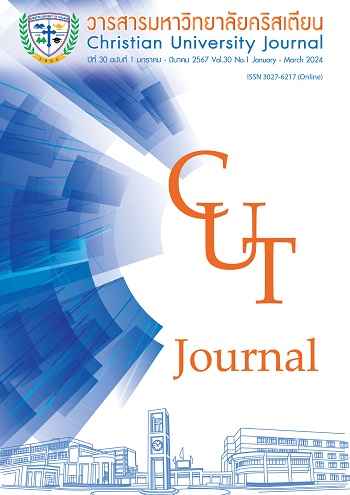ผลของการบริโภคอาหารต่อจุลินทรีย์ในลำไส้และสุขภาพ
คำสำคัญ:
จุลินทรีย์ในลำไส้, กรดไขมันสายสั้น, สารอาหาร, สารพฤกษเคมีบทคัดย่อ
อาหารมีผลสำคัญต่อการเปลี่ยนแปลงองค์ประกอบของจุลินทรีย์ในลำไส้ซึ่งส่งผลกระทบต่อสุขภาพ โดยจุลินทรีย์สามารถผลิตสารเมแทบอไลต์ที่ส่งเสริมการมีสุขภาพที่ดีรวมทั้งส่งผลต่อการเกิดโรคในโฮสต์ได้ ซิมไบโอติก แบคทีเรีย (Symbiotic bacteria) เป็นแบคทีเรียที่มีความสัมพันธ์ในการให้ประโยชน์ซึ่งกันและกันระหว่างแบคทีเรียและโฮสต์ สารเมแทบอไลต์จากซิมไบโอติกแบคทีเรีย สามารถต่อต้านการรุกรานของจุลินทรีย์ก่อโรค ขณะที่แบคทีเรียที่ใช้ใยอาหารเช่น ธัญพืช ผักและผลไม้ซึ่งไม่สามารถย่อยได้ด้วยเอนไซม์ในระบบทางเดินทางอาหารจากกระบวนการหมักได้สารประกอบกรดไขมันสายสั้น (Short chain fatty acids, SCFAs) เช่น บิวไทเรท โพรปิโอเนต และอะซีเตท ซึ่งมีส่วนช่วยในการควบคุมกระบวนการเมแทบอลิซึมของร่างกายและป้องกันการเกิดโรคไม่ติดต่อเรื้อรังและโรคเสื่อมของระบบประสาท จุลินทรีย์ในลำไส้บางกลุ่มสามารถสลายกรดอะมิโนจากอาหารโปรตีนบางชนิดได้สารเมแทบอไลต์ที่ส่งผลกระทบต่อสุขภาพโดยสามารถเกิดสารประกอบที่เป็นสารพิษที่ออกฤทธิ์ต่อเซลล์ ขณะที่สารประกอบกรดอินโดล-โพรปิโอเนต (Indole-propionate acid) จากกรดอะมิโนทริปโตเฟนจะช่วยรักษาสมดุลของลำไส้และป้องกันการอักเสบของลำไส้ได้ นอกจากนี้การรับประทานอาหารที่มีไขมันสูงและอาหารที่มีการแปรรูปสูงโดยมีส่วนประกอบของคาร์โบไฮเดรตที่ผ่านการขัดสี มีน้ำตาลเชิงเดี่ยวหรือเกลือในปริมาณสูง จะทำให้แบคทีเรียที่ผลิตกรดไขมันสายสั้นมีจำนวนลดลง เพิ่มสารตั้งต้นการอักเสบและภาวะเครียดออกซิเดชันที่เป็นสาเหตุการเกิดโรคไม่ติดต่อเรื้อรังหรือโรคเสื่อมของระบบประสาท ขณะที่การรับประทานธัญพืช ผัก ผลไม้ที่มีสารพฤกษเคมีสามารถเพิ่มแบคทีเรียที่ดีต่อลำไส้ได้ ดังนั้น ความเข้าใจเกี่ยวกับผลของการบริโภคอาหารต่อจุลินทรีย์ในลำไส้และสุขภาพอาจมีส่วนช่วยในการนำไปประยุกต์เพื่อเป็นแนวทางบริโภคอาหารที่มีส่วนในการป้องกันการเกิดโรคและเป็นทางเลือกสำหรับการมีสุขภาพที่ดี
เอกสารอ้างอิง
วสุนธรา รตโนภาส. 2560. กินดีสำหรับสุขภาพดีในศตวรรษที่ 21. สักทอง: วารสารวิทยาศาสตร์และเทคโนโลยี (สทวท.), 4(1), 1-13.
Abu-Ghazaleh, N., Chua, W.J. & Gopalan, V. (2021). Intestinal microbiota and its association with colon cancer and red/processed meat consumption. Journal of Gastroenterology and Hepatology, 36, 75-88.
Cai, J., Rimal, B., Jiang C, Chiang, J.Y.L., Patterson, A.D. (2022). Bile acid metabolism and signaling, the microbiota, and metabolic disease. Pharmacology & Therapeutics, 237(108238), 1-30.
Chierico, F.D., Vernocchi, P., Dallapiccola, B. & Putignani, L. (2014). Mediterranean diet and health: Food effects on gut microbiota and disease control. International Journal of Molecular Sciences, 15(7), 11678-11699.
Curtis, M.M. & Sperandio, V. (2011). A complex relationship: The interaction among symbiotic microbes, invading pathogens, and their mammalian host. Mucosal Immunology, 2(4), 134-138.
Duthie, S.J., Duthie, G.G., Russell, W.R., Kyle, J.A.M., Macdiarmid, J.I., Rungapamestry ,V., Stephen, S., Megias-Baeza, C., Kaniewska, J.J., Shaw, L., Milne, L., Bremner, D., Ross, K., Morrice, P., Pirie, L.P., Horgan, G. & Bestwick , C.S. (2018). Effect of increasing fruit and vegetable intake by dietary intervention on nutritional biomarkers and attitudes to dietary change: A randomised trial. European Journal of Nutrition, 57(5), 1855–1872.
Feng, W., Ao, H. & Peng, C. (2018). Gut microbiota, Short-chain fatty acids, and herbal medicines. Frontiers in Pharmacology, 9, 1-12.
García-Montero, C., Fraile-Martínez, O., Gómez-Lahoz, A.M., Pekarek, L., Castellanos, A.J., Noguerales-Fraguas, F., Coca, S., Guijarro, L.G., García-Honduvilla, N., Asúnsolo, A., Sanchez-Trujillo, L., Lahera, G., Bujan, J., Monserrat, J., Álvarez-Mon, M., Álvarez-Mon, M.A. & Ortega, M.A. (2021). Nutritional components in western diet versus mediterranean diet at the gut microbiota–immune system interplay. Implications for health and disease. Nutrients, 13(699), 1-49.
Gentile, C.L. & Weir, T.L. (2018). The gut microbiota at the intersection of diet and human health. Science, 362(6416), 776–780.
Janeiro, M.H, Ramírez, M.J., Milagro, F.I., Martínez, J.A. & Solas, M. (2018). Implication of trimethylamine n-oxide (TMAO) in disease: Potential biomarker or new therapeutic target. Nutrients, 10(1398), 1-22.
Kowalski, K & Mulak, A. (2019). Brain-gut microbiota axis in Alzheimer’s disease. Journal of Neurogastroenterol Motil, 25(1), 48-60.
Krga, I. & Glibetic, M. (2021). Gut microbiota in health and diseases. Reference Module in Food Sciences, 1-17.
Leo, E.E.M. & Campos, M.R.S. (2020). Effect of ultra-processed diet on gut microbiota and thus its role in neurodegenerative diseases. Nutrition, 71, 1-7.
Morrison, D.J. & Preston, T. (2016). Formation of short chain fatty acids by the gut microbiota and their impact on human metabolism. Gut Microbs, 7(3), 189–200.
Parker, A., Fonseca, S. & Carding, S.R. (2020). Gut microbes and metabolites as modulators of blood-brain barrier integrity and brain health. Gut Microbes, 11(2), 135–157.
Pei, R., Liu, X.& Bolling, B. (2020). Flavonoids and gut health. Current Opinion in Biotechnology, 61, 153–159.
Pickard, J.M., Zeng, M.Y., Caruso, R. & Núñez, G. (2017). Gut microbiota: Role in pathogen colonization, immune responses, and inflammatory disease. Immunological Reviews, 279(1), 70-89.
Pujari, R. & Banerjee, G. (2021). Impact of prebiotics on immune response: From the bench to clinic. Immunology & Cell Biology, 99(3), 255–273.
Rinninella, E., Raoul, P., Cintoni, M., Franceschi, F., Miggiano, G.A.D., Gasbarrini, A. & Mele, M.C. (2019). What is the healthy gut Microbiota composition? A changing ecosystem across age, Environment, Diet, and Diseases. Microorganisms, 7(14), 17-22.
Rios-Covian, D., González, Sonia, Nogacka, A.M., Arboleya, S., Salazar, N., Gueimonde, M. & de los Reyes-Gavilán, C.G. (2020). An overview on fecal branched short-chain fatty acids along human life and as related with body mass index: Associated dietary and anthropometric factors. Frontiers in Microbiology, 11(973), 1-9.
Santos-Marcos, J.A., Perez-Jimenez, F. & Camargo, A. (2019). The role of diet and intestinal microbiota in the development of metabolic syndrome. Journal of Nutritional Biochemistry, 70, 1–27.
Sarkar, S.R. & Banerjee, S. (2019). Gut microbiota in neurodegenerative disorders. Journal of Neuroimmunology, 328, 98–104.
Shin, J.H. & Seeley, R.J. (2019). Reg3 proteins as gut hormones?. Endocrinology, 160(6), 1506–1514.
Silveira-Nunes, G., Durso, D.F., de Oliveira Jr, L.R.A., Cunha, E.H.M., Maioli, T.U., Vieira, A.T., Speziali, E., Corrêa-Oliveira, R., Martins-Filho, O.A., Teixeira-Carvalh, A, Franceschi, C., Rampelli, S., Turroni, S., Brigidi, P. & Faria, A.M.C. (2020). Hypertension is associated with intestinal microbiota dysbiosis and inflammation in a brazilian population. Frontiers in Pharmacology, 12, 1-14.
Silva, Y.P., Bernardi, A. & Luiz, R. (2020). The role of short-chain fatty acids from gut microbiota in gut-brain communication. Frontiers Endocrinology, 11, 1-14.
Singh, R.K., Chang, H-W., Yan, D., Lee, K.M., Ucmak, D., Wong, K., Abrouk, M., Farahnik, B., Nakamura, M., Zhu, T.H., Bhutani, T. & Liao, W. (2017). Infuence of diet on the gut microbiome and implications for human health. Journal of Translational Medicine, 15(73), 1-17.
Verduci, E., Carbone, M.T., Borghi, E., Ottaviano, E., Burlina, A. & Biasucci, G. (2020). Nutrition, Microbiota and role of gut-brain axis in subjects with phenylketonuria (PKU). A Review Nutrients, 12(3319), 1-31.
Wan, Y., Wang, F., Yuan, J., Li, J., Jiang, D., Zhang, J., Li, H., Wang, R., Tang, J., Huang, T., Zheng, J., Sinclair, A.J., Mann, J. & Li, D. (2019). Effects of dietary fat on gut microbiota and faecal metabolites, and their relationship with cardiometabolic risk factors: A 6-month randomised controlled-feeding trial. Gut Microbiota, 68(8), 1417-1429.
Wu, S., Ahmed Bekhit, A.E.D., Wu, Q., Chen, M., Liao, X., Wang, J. & Ding, Y. (2021). Bioactive peptides and gut microbiota: Candidates for a novel strategy for reduction and control of neurodegenerative diseases. Trends in Food Science & Technology, 108, 164–176.
Wu, W., Kong, Q., Tian, P., Zhai, Q., Wang, G., Liu, X., Zhao, J., Zhang, H., Lee, Y.K. & Chen, W. (2020). Targeting gut microbiota dysbiosis: Potential intervention strategies for neurological disorders. Engineering, 6(4), 415-423.
ดาวน์โหลด
เผยแพร่แล้ว
ฉบับ
ประเภทบทความ
สัญญาอนุญาต
ลิขสิทธิ์ (c) 2024 มหาวิทยาลัยคริสเตียน

อนุญาตภายใต้เงื่อนไข Creative Commons Attribution-NonCommercial-NoDerivatives 4.0 International License.



